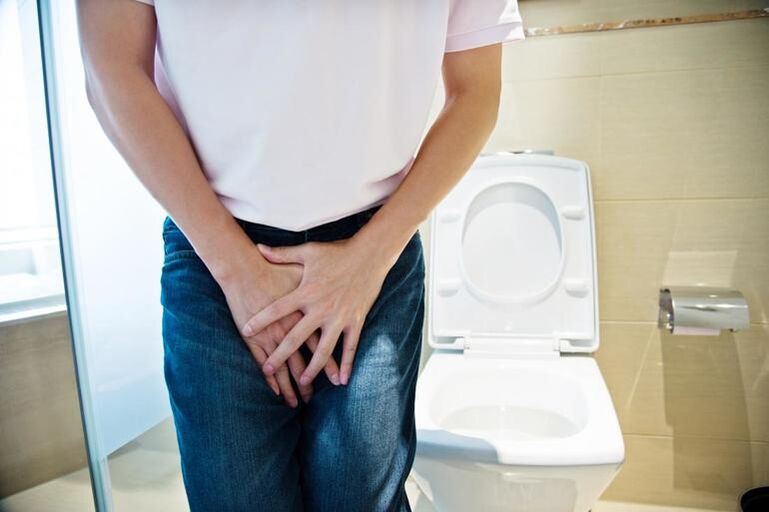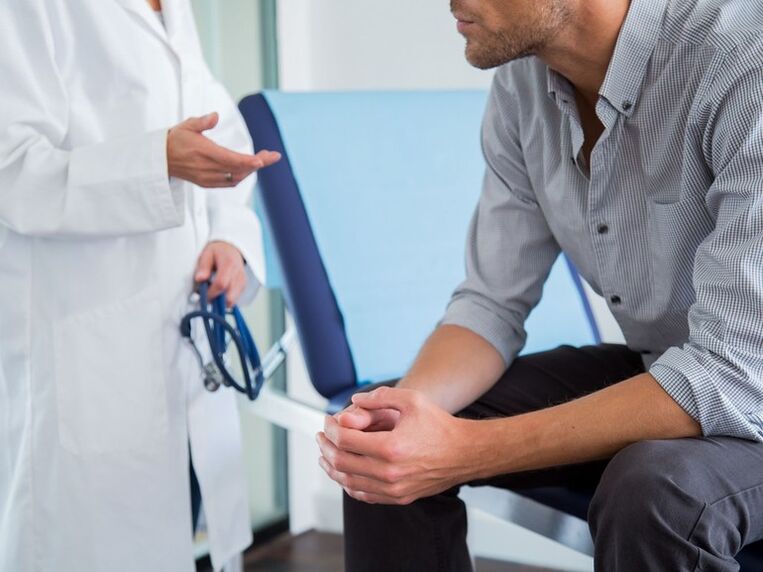Inflammation of the prostate gland, that is, the prostate, regardless of the cause of the disease, as a rule, obtains a chronic course. In order for effective treatment of chronic prostatitis to be achieved, you need to know for the reasons that appear.

Good health, beloved reader. In connection, Alexander Burusov is a specialist in the Club Men's Viva Man, and we continue to understand the problem of chronic prostatitis, causes, symptoms and treatment options.
In this article, we will try to find out what's better to treat this terrible disease, what options are in our disposal. Let's start analyzing the most modern and most effective methods for treating prostatitis in men.
What is prostatitis?
Prostatitis is called inflammation of the prostate gland. It can occur due to weakness of immunity, infection, hypothermia, stress, inactive lifestyle, active or, rather, irregular sex life, enters the body.
Prostate or prostate iron is part of the male reproductive system. It is the basis of the urethra. Prostate size can be compared to walnut size. The main function of this organ is the secret development responsible for spermatozoa activities.
There are 4 types of diseases:
- Chronic bacteria.
- Chronic, not associated with bacterial development.
- Without chronic symptoms.
- Spicy.
All other types of prostatitis do not have the manifestation mentioned, so diagnosing it is always difficult. The main symptoms of chronic diseases include:

- Pain in the lower abdomen (can be given backward).
- Release from the urethra (can be transparent or purulent).
- Disruption of sexual function.
- Far -far -heands.
Prostatitis can occur without symptoms and is only diagnosed based on test results. He can arise in a man over the age of 25. After 35 years, the risk of its development increased significantly, and at the age of 45, the probability of diagnosing prostatitis was 50%. Therefore, in adulthood, it is necessary to conduct urological examination every year, which will help detect the disease early and start treatment on time.
Diagnosis of a disease
Only urologists can determine the presence of prostatitis. After the inspection, he can appoint additional examinations:
- Physical examination is prostate palpation, where it is possible to determine the condition and size of the gland.
- Transrectal ultrasound.
- Smear analysis or prostate secret for the presence of leukocytes and bacteria.
- Clinical urine analysis in which protein, leukocytes and bacteria are available.
- Ejaculation analysis.
- Cytological urine analysis.
- Bacterial urine analysis.
- Analysis of dog protein levels.
- Urodynamic study.
- Cytoscopy. It can only be given if there are signs, in case of injury or in preparation for surgery.
The cause and hunting of the disease
Inflammatory diseases of the genitourinary system, the rectum, due to close contact with the prostate gland, leads to the formation of the focus of inflammation. The vessels that feed the prostate are the branches of the bladder artery, the rectum, the posterior sacred artery, the artery in the thighs. Any infectious focus found in these organs can fall into the iron.

The presence of chronic infections - where localization, for example, nasal sinus, leads to weakness of immunity, and pathogenic microorganisms available to the skin, in the intestines, urethra - become pathogenic. This leads to the development of chronic processes.
Violation of the prostate gland circulation due to blood vessels against the reduced physical activity background leads to deterioration of the flow of drugs to the prostate gland and complicates the treatment of chronic prostatitis in men.
Increased blood flow to the organs located in the pelvis is not only due to low physical activity, but also from several factors:
- Irregular sex life;
- sex disorders;
- smoking, alcohol;
- varicose veins from the lower leg;
- paraproctitis and proctitis;
- Thrombophlebitis hemorrhoidal veins against chronic hemorrhoids;
- cracks and anal fistulas;
- Vascular wall tone is controlled by sympathetic and parasympathetic nervous systems, with flowing diseases and blood flow from disturbed organs;
- Trauma to the throat among riders, cyclists, motorcyclists.
With sexually transmitted urogenital infections, the disease cannot always cure - this is the cause of the development of chronic prostatitis. The most frequent pathogens are:
- Trichomonas;
- mycoplasmas;
- Gonococci;
- Gardnerella;
- ureaplasma;
- Chlamydia;
- mushrooms;
- virus;
- E. coli;
- Streptococci;
- Enterococci;
- Staphylococci.

These microorganisms are difficult to heal.
Hormone activity after 40 years in a man gradually begins to fade. At first it flows without symptoms.
The decrease in recurrent testosterone production leads to a slight deterioration of the prostate gland secretion in its granules. Little by little, this stagnation increases. The materials contained in the secret of the prostate are not completely removed. Secretory, motor, function of the secretion of the prostate gland secretion begins to suffer.
Cymmonic acid in prostatic juice performs bactericidal function, diluting it. With inadequate citric acid stagnation, bacterial infections begin to develop. The level of citric acid in prostatic juice is directly related to the amount of testosterone in the blood.
Clinical picture of the disease
Symptoms of chronic prostatitis in men:
- Sensation of discomfort, pain above the pubis;
- Pain of shooting periodically in the rectum and sacrum;
- increased urination and pain, especially after hypothermia, stress;
- unclear release;
- violations of ejaculation, erection;
- premature ejaculation;
- increased sweating;
- Sleep affected;
- Periodic increase in body temperature is not more than 37. 2-37. 3 0 C In the evening.

From what symptoms occur: pain, urination or sexual dysfunction - the treatment of chronic prostatitis in men depends.
The main component of the treatment of the disease
It is necessary to highlight the main field of treatment:
- medications;
- normalization of the work regime and rest;
- rational nutrition;
- rejection of bad habits;
- Physoalization, massage;
- People's recovery.
Drug
Effective treatment of prostatitis should be aimed at eliminating the cause of prostatitis. The drug is selected individually by the doctor after conducting the required diagnostic study. Let's analyze how and how to treat prostatitis if it has a chronic form. The main instructions of drug therapy:
- antibiotics;
- anti -inflammatory drugs;
- antispasmodic to increase urine flow;
- Urantiseptic to eliminate urinary system infections;
- preparations that increase arterial and vein blood flow;
- Drugs that increase instability, reduce blood viscosity;
- vitamins;
- enzymes;
- sedative, psychotherapy effects;
- correction of immune disorders;
- Treatment of metabolic disease and hormone dysfunction.
Antibacterial therapy
Whether we cure chronic prostatitis, depending on good antibacterial therapy. It is important to note that therapy and treatment of prostatitis will be effective only if the proper type and level of disease.
Antibiotics are selected by those who penetrate the prostate well, acting effectively on the pathogen. Some pathogens of chronic prostatitis, such as ureaplasma, are not sensitive to powerful drugs such as:

- tetracycline;
- some cephalosporins;
- Levofloxacin;
- Clarithromycin.
Anti -anti -ssteroid drugs
The effects of non -ssteroid anti -anti -medication (NSAIDs) are associated with normalization of vascular wall permeability, micro -circulation recovery. They reduce education and do not allow existing inflammation mediators to be absorbed. We must remember NSAID property, forming ulcers in the stomach and duodenum.
It is most rational to use rectal candles with NP, such as indomethacin.
Normalization of blood flow with drugs
Normal blood flow is achieved with adequate arterial diameter that leads to blood to the veins, which comes out of the flow of oxygen blood. It is also necessary to reduce blood viscosity and achieve good instability in the capillary tract.
To achieve good results in the treatment of prostate chronic diseases, it is necessary to treat urethra, bladder and kidney inflammation. For this purpose, the drug is used:
Prostatitis inevitably reduces potential, weakens libido, disrupts erection. This phenomenon is always accompanied by symptoms of dysphoria, reducing mood background, and mood changes. With these symptoms, sedatives, anxiolytics, and antidepressants are prescribed.
Phytotherapy
It is known that herbal remedies are an alternative to the use of medicines in the treatment of many diseases. Is it possible to cure prostatitis with its help? Often, to improve metabolic processes in the prostate, doctors recommend using medicinal herbs (licorice, nettles, peony, plantain, st. John, etc. ). All of these plants contain many selenium and zinc. However, they should be used only as part of complex therapy. As a rule, this herb decoctions are used for bathing.
The influence of physiotherapy
The following methods for chronic processes are used to affect the prostate:

- ultrasound
- electrophoresis;
- Bath with hot water with chamomile decoctions, linden, sage, thyme;
- Warm enema
- prostate massage through the rectum;
- Hirudotherapy
- Uhf;
- inductothermia;
- Microwave resonance therapy.
The degree of severity of psychological deviation and manifestation of depression depends on how many chronic prostatitis is treated. To speed up the treatment process, if there is no contraindication, physiotherapeutic exposure method must be added.
Nutrition suggestions
Standard recommendations for all chronic diseases in the form of fried, salty, praised, smoking in this condition are inadequate. Effective treatment of prostatitis depends on rational and balanced nutrition. It should add foods like celery, ginger, turmeric, apibod.
They contain:
- silicone, which normalizes the formation of hormones in the body;
- B vitamins, remove toxins and restore the redox process;
- Chrome, germanium, selenium, zinc normalize the work of sympathetic and parasympathetic systems;
- Vitamin C, and normalizes cell membrane permeability, has antioxidant properties;
- Very amino acid, omega 3, which rejuvenates sexual function.
Apitherapy uses: natural honey, pegs, wallets, royal jelly, dead bees, bee pollen.
Folklore
The course of chronic prostatitis treatment is compulsory with medicinal herbs, which should take into account all of these mechanisms for the development of the disease. Then the therapeutic effect will be fully achieved.
It is possible to use the following medicinal herbs:
- Nettle, smart, stubborn;
- Mint, plantain, hernica;
- Rosehip, yarrow, wormwood;
- thyme, birch buds, linden flowers;
- Successfully drowned, chamomile, parent.
Chronic prostatitis healing depends on the use of prolonged herbs according to the scheme combined with a controversial drug therapy course.

Decoctions are used, infusions for oral administration, for bathing, for microclems. Apply tinctures, that is, drugs containing alcohol are not recommended. This prevents the treatment of successful chronic urogenital disease.
All of these drugs have a good effect on the treatment of prostatitis in the etiology of hormones, stagnants, hormones.
Prevention
It is best to cure prostatitis will tell the urologist after examining the patient. However, like any other diseases, prostatitis is more easily prevented than eliminating the consequences of the disease. This is necessary:
- Lead an active lifestyle. Normal sports inhibit a stable phenomenon in the pelvis and improve blood circulation. Good effects have: swimming, sports, dancing, fitness. At the same time, power sports should be avoided.
- Make sure the nutrition is proper. It is worth limiting the amount of fried, salty, fat, spicy, oranges and smoke. The basics of diet should be: fresh vegetables and fruits, dairy products, cereals. It is important to adhere to the drinking regime.
- Avoid random sexual relations.
- Maintaining a normal sex life. For a middle -aged man, the norm is sex several times a week. This contributes to the natural sequence of the prostate gland, which significantly reduces the risk of spreading in various bacteria.
- It is important to avoid hypothermia.
- Each year, it is necessary to undergo an examination by a urologist.
After 35 years, everyone is required to monitor their health, as during this time the risk of prostatitis is increasing. To prevent the occurrence of the disease, it is important to take simple precautions and regularly undergo medical examinations, which will help identify the pathology at an early stage when easy to treat.






























